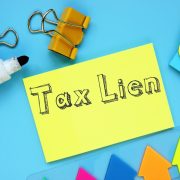Investing in Tax Liens with Self-Directed IRAs
Most of you who are reading this article are probably already familiar with Self-Directed IRAs. These marvelous vehicles for retirement savings have been around for several decades and have become a staple in the retirement portfolios of millions of Americans. But there is a good chance you have not heard of using tax liens with Self-Directed IRAs.
In fact, you might not know much about Self-Directed IRAs and may be wondering why you should even be interested in them. Well, they are not drastically different from the Traditional IRA, but they can be more powerful and comprehensive: more powerful because you have added control over your investments and more comprehensive because you have a wider range of investment options from which to choose.
Case in point: tax liens. Most IRA custodians limit your investment choices to mutual funds, individual stocks and bonds, and certificates of deposit (CDs). Investing in tax liens would not be allowed. With a Self-Directed IRA, however, alternative investments like gold, real estate, private stock, and tax liens are available to provide additional diversification for your retirement portfolio. Let’s take a closer look at tax liens for Self-Directed IRAs.
What is a tax lien?
Because local governments count on tax revenues to fund services, they may file a lien against the assets (typically real estate) of any individual who has fallen behind in tax payments. Then, instead of waiting until an unknown future date to collect the funds, the government agency will sell the lien at a public auction. The returns can be very appealing. For example, South Carolina offers a 12% return and Texas offers up to a 50% return.
Investors can bid on these liens at auction and, if they are successful, can earn a good return on a secure investment. The government agency raises immediate revenues, and the investor receives the legal right to accept tax payment, plus interest, from the delinquent property owner. The interest rate is determined during the bidding. Click here to download our free guide about investing in tax liens.
What is the process of purchasing a tax lien?
States and counties often host websites that contain a list of available properties that include pictures and other pertinent information. Investors are responsible for evaluating the value of the tax lien and also the asset that supports its value. Investors place their bids in the auction and either write a check for the transaction or make arrangements with the auctioneer to pay from their Self-Directed IRA account.
Certain auctions may require buyers to fund their transactions faster than a self-directed account custodian can review and approve the transaction. The solution for this is to fund an escrow account in advance, which involves filing for a trust EIN and opening the account using the EIN instead of a social security number.
By now it should be evident that unless you are an experienced tax lien investor, you should be seeking the help of a professional. Tax liens are one of those alternative investments that make sense in a Self-Directed IRA, so it should also make sense to ensure that the process of obtaining them goes as smoothly as possible.
Once you have purchased the tax liens, you become the lienholder and wait for the delinquent taxpayer to pay the taxes. If the taxpayer fails to pay, at some point you will legally be allowed to enforce collection through foreclosure. Some laws govern the foreclosure process so, once again, it is crucial that you have professional assistance.
What are the benefits to the investor?
In most cases, the investor is paid back all of the property taxes plus any interest that has accumulated. Sometimes, however, the property owner does not pay the taxes and the lienholder can sell the property at the best price available in the real estate market.
Tax liens with Self-Directed IRAs take the first position in most states, which makes them a secure investment, and the higher-than-normal interest rates that are paid on the liens make them preferable to CDs and treasury bonds.
Whether an investor ends up collecting interest on the debt or receives equity through foreclosure, the portfolio diversification that comes from investing in tax liens has to be considered as one of the prime benefits to a Self-Directed IRA.
We can help you get started
At American IRA, we have the tax lien professionals you need. With our simplified process, you can easily take care of your tax lien investing and tax sales transactions.
For more information on Tax Liens with Self-Directed IRAs, call us today at 866-7500-IRA (472) or visit us at www.AmericanIRA.com. You can also click here for more information about tax liens.




